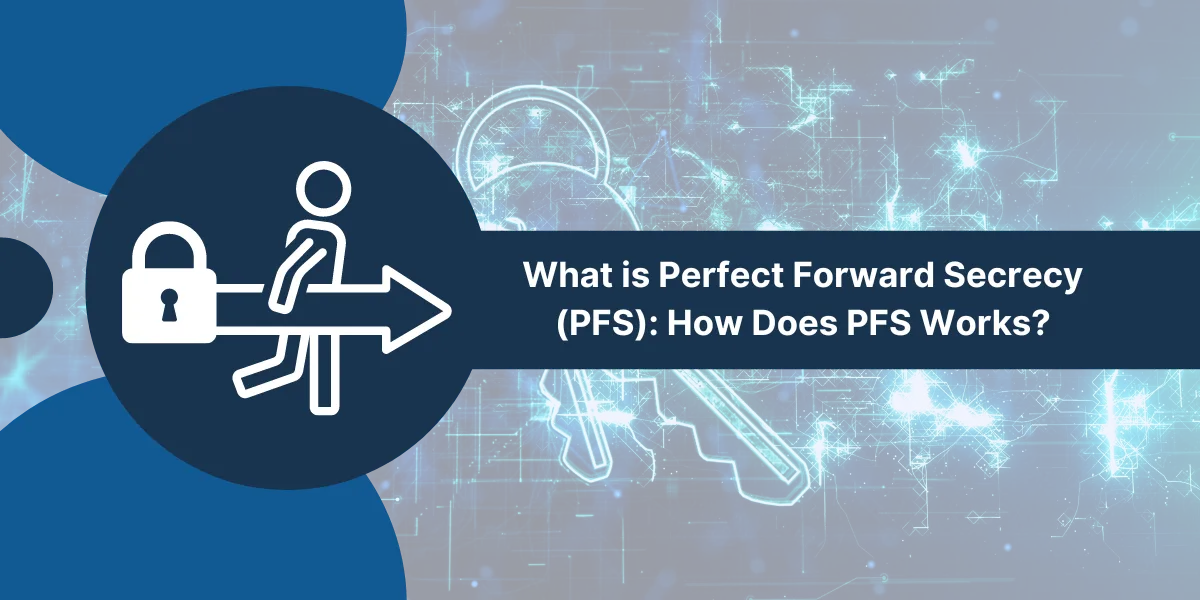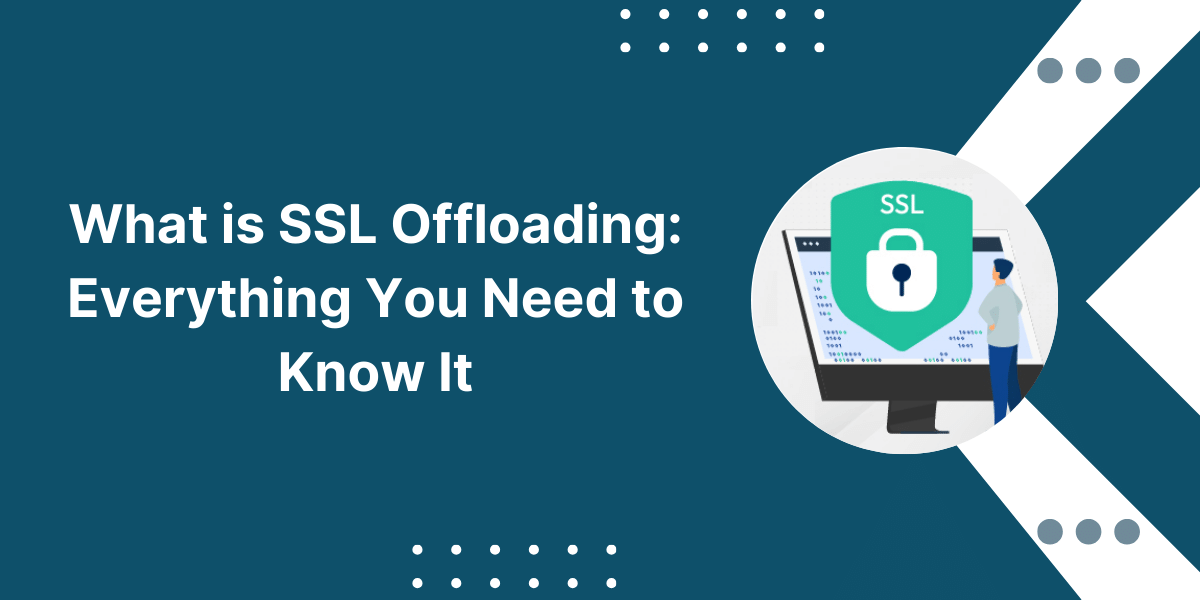What is Perfect Forward Secrecy (PFS)?
Perfect forward secrecy (PFS) is an encryption feature in which compromised session keys cannot be used to decrypt previous encrypted communications. It ensures encrypted data remains secure even if an attacker obtains an encryption key.
With normal encryption, keys used to encrypt communications are often derived from previous keys or an initial master key. This means that if one encryption key is compromised, previous ones can be determined and used to decrypt prior encrypted data.
Perfect forward secrecy breaks this cycle of deriving keys from past ones. It generates a unique random session key for each encryption session. This key is then combined with the recipient’s public key to generate a temporary private key for decrypting that session’s data.
Even if an attacker manages to obtain a target’s private encryption key, they cannot reverse engineer the session key or decrypt previous communications. Perfect forward secrecy maintains security for past data, limiting the impact of key compromises.
PFS is implemented through modifications to key exchange processes within encryption protocols. Unique session keys are generated using mathematical algorithms that combine random data with the existing public/private key pair.
Common protocols that implement perfect forward secrecy include Transport Layer Security (TLS), Secure Shell (SSH), Off-the-Record Messaging (OTR), and ZRTP. These are used to secure HTTPS web browsing, remote server administration, encrypted messaging, and private voice-over IP calls, respectively.
Key Takeaways
- Perfect Forward Secrecy (PFS) is a feature of encryption protocols that provides an additional layer of security for encrypted communications.
- It ensures that if one encryption key is compromised, previous session keys cannot be obtained, maintaining the secrecy of prior communications.
- PFS generates unique session keys for each encryption session rather than deriving keys from previous ones.
- This prevents attackers from decrypting earlier communications if they manage to obtain the current encryption key being used.
- Popular protocols that use PFS include TLS, SSH, and Off-the-Record Messaging.
- PFS comes at the cost of decreased performance and efficiency compared to normal encryption protocols.
- Organizations must decide if the additional security of PFS is worth the tradeoff in speed and computational overhead.
- The use of PFS provides robust protection against retrospective decryption attacks on encrypted data.
How Does Perfect Forward Secrecy PFS Work?
Perfect forward secrecy is implemented by altering the cryptographic key exchange process that establishes encrypted sessions. This enhances security by avoiding deriving session keys from prior ones that could be compromised. But how does PFS accomplish this?
Here is a simplified overview of how perfect forward secrecy functions during a key exchange between parties:
- The recipient generates a long-term, static public/private key pair and shares the public key openly.
- When an encrypted session is initiated, the sender generates a random temporary key just for that session.
- Using the chosen PFS algorithm, the sender combines their temporary session key with the recipient’s public key to produce a temporary private key. This step is a mathematical operation.
- The sender encrypts the session’s communications using the temporary private key that was derived in the previous step.
- The recipient can use their static private key to decrypt the temporary private key. Using the decrypted temporary key, they can then decrypt the session data.
- At the end of the session, the temporary keys are disposed of and the process starts over for each new session. New random temporary keys are generated each time.
This process ensures that each encryption session relies on unique one-time keys. Even if the long-term public/private key pair is compromised later, the discarded temporary keys for past sessions are lost forever, maintaining perfect forward secrecy.
Why is Perfect Forward Secrecy Important?
Perfect forward secrecy provides crucial protection against retrospective decryption attacks. These occur when an adversary intercepts encrypted data and decrypts it later if they manage to obtain the encryption keys.
Without PFS, if an encryption key is stolen, attackers can use it to decrypt earlier recorded sessions encrypted using that key or keys derived from it. This allows accessing potentially sensitive historical communications.
For example, recordings of HTTPS traffic could be decrypted if the server’s private key is stolen in the future. Private chat logs from years ago become exposed. Perfect forward secrecy protects against this threat.
Even if encryption keys are compromised today, perfectly forward secure protocols mean the unique one-time keys for past communications sessions are lost. Those previous sessions remain encrypted and inaccessible.
PFS also limits damage when certificates or keys are stolen. An attacker with a stolen key can only decrypt data from that point onwards. They cannot retrospectively decrypt anything communicated beforehand. This containment of exposure is critical for minimizing breaches.
Perfect forward secrecy acts like a self-destruct mechanism for encryption keys. Previous sessions become undecipherable even if current keys fall into the wrong hands. This provides stronger cryptographic security and better protection of encrypted data.
What are the Popular Protocols that Use Perfect Forward Secrecy
Many secure communication protocols and applications implement perfect forward secrecy to enhance protection and limit past data exposure. Some examples include:
- Transport Layer Security (TLS): TLS provides secure HTTPS-encrypted web browsing. TLS 1.3 and above support PFS via ephemeral Diffie-Hellman key exchange, which protects past web traffic if server certificates are stolen.
- Secure Shell (SSH): SSH creates encrypted network connections for remote server administration and file transfers. SSH incorporates PFS using ephemeral Diffie-Hellman during key re-exchange to protect sessions.
- Signal: The Signal end-to-end encrypted messaging app uses an extended variant of the Double Ratchet algorithm called X3DH. It exchanges Diffie-Hellman public keys to derive message keys with PFS.
- WhatsApp: WhatsApp’s Voice over IP calling feature implements the ZRTP key exchange protocol. ZRTP uses ephemeral Diffie-Hellman with hash commitments to enable perfect forward secrecy for secure calls.
- OTR Messaging: Off-the-Record (OTR) Messaging for private encrypted chats generates a new set of encryption keys for each conversation using a Diffie-Hellman key exchange. It provides perfect forward secrecy.
What are the Advantages of Perfect Forward Secrecy
Implementing perfect forward secrecy provides several advantages:
- Prevents retrospective decryption: PFS protects past sessions even if keys are stolen in the future. Earlier communications cannot be decrypted retroactively.
- Minimizes compromises: Compromised keys only expose data from that point on. Previous communications remain hidden and secure.
- Reduces damage: Key compromises have limited impact as prior exchanges stay protected through PFS.
- No reliance on long-term keys: Session keys are temporary and unrelated to long-term public/private key pairs. Their exposure does not affect overall encryption.
- Stronger cryptographic security: PFS represents an additional layer of defense that makes encryption more robust overall.
- Peace of mind: Users and organizations can be confident that old communications will stay private even in the event of future key thefts.
What are the Disadvantages & Challenges of PFS
While perfect forward secrecy enhances encrypted communications security, it also comes with some drawbacks:
- Performance overhead: Generating unique session keys is computationally intensive and adds latency. This can degrade the efficiency of applications.
- Compatibility issues: Older protocols and legacy systems may not support PFS, preventing its use in some environments.
- Key management complexity: The constant key generation of PFS adds complexity for applications and administrators. Rotating keys must be tracked.
- No protection of metadata: While session data is secured, PFS does not encrypt metadata like IPs, timestamps, etc. This can still leak some information.
- Denial of service risks: If not implemented securely, the Diffie-Hellman exchanges used for PFS are vulnerable to denial-of-service attacks.
When deciding to implement PFS, organizations must weigh the increased security against potential performance, cost, and complexity tradeoffs. Multi-layer encryption and wise cryptographic choices can minimize any disadvantages.
Final Thoughts
Perfect Forward Secrecy is a crucial encryption feature that provides enhanced security and peace of mind for secure communications. By deriving random one-time session keys, PFS ensures the compromise of current keys cannot decrypt past exchanges. Even if encryption is broken in the future, previous conversations, transactions, and access sessions remain hidden from prying eyes.
PFS represents a best practice for encryption hygiene and limiting data exposure. Both individuals and organizations should seek out protocols and apps providing perfect forward secrecy wherever strong cryptographic protection is needed. As threats evolve, PFS will only grow in importance for anyone relying on encryption to safeguard their communications, privacy, and sensitive data.
FAQs About Perfect Forward Secrecy (PFS)
Here are answers to some frequently asked questions about perfect forward secrecy:
What is perfect forward secrecy?
Perfect forward secrecy (PFS) is an encryption feature in which each session has unique keys that cannot be derived from subsequent keys. This prevents the decryption of past sessions even if current keys are compromised.
How does perfect forward secrecy work?
PFS works by generating random one-time session keys instead of deriving keys from past ones. This breaks the chain so previous session keys are lost forever when no longer needed.
Why is PFS important for security?
It protects past communications from retrospective decryption. If keys are stolen in the future, previous exchanges remain hidden since their unique keys are destroyed.
What protocols use perfect forward secrecy?
TLS, SSH, Signal, WhatsApp, OTR Messaging, ZRTP, and other protocols support PFS using Diffie-Hellman key exchanges and ephemeral keys.
What are the disadvantages of perfect forward secrecy?
Due to extra computation, PFS can reduce performance and efficiency. It also adds key management complexity. Older systems may not support PFS.
Does PFS protect metadata?
No, perfect forward secrecy only encrypts session data. Metadata like IP addresses, timestamps, and other unencrypted information can still leak during connections.
Can PFS prevent decryption if a server is compromised?
Yes, with PFS, an attacker must obtain both the live session key and private key to decrypt data. Compromising the server does not expose past communications.
Is PFS used in HTTPS and web browsers?
Yes, modern web browsers and websites using TLS 1.3 or higher support PFS for HTTPS connections. This protects past web traffic if certificates are stolen.
How does PFS differ from forward secrecy?
Forward secrecy uses session keys but still derives future keys from past ones. Perfect forward secrecy generates keys randomly and does not derive them, preventing retrospective decryption.

Priya Mervana
 Verified Web Security Experts
Verified Web Security Experts
Priya Mervana is working at SSLInsights.com as a web security expert with over 10 years of experience writing about encryption, SSL certificates, and online privacy. She aims to make complex security topics easily understandable for everyday internet users.



